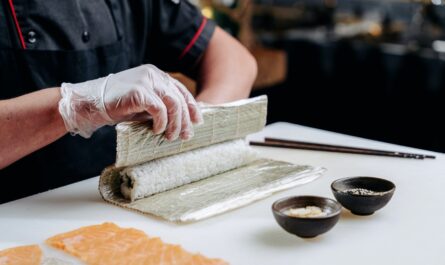For those who appreciate the delicate art of sushi making, knowing the secrets of storing sushi rice vinegar mix is crucial. This mix is a fundamental component of sushi rice, providing the distinct flavor that sushi lovers crave. Understanding how to store it properly can make all the difference in your sushi-making experience.

What is Sushi Rice Vinegar Mix?
Before diving into storage techniques, its essential to understand what sushi rice vinegar mix is. This mix typically consists of rice vinegar, sugar, and salt. It is added to cooked sushi rice to give it the signature taste and texture that pairs perfectly with fish and other sushi ingredients.
Ingredients in Sushi Rice Vinegar Mix
Rice Vinegar
Rice vinegar is the key ingredient that imparts the tangy flavor to sushi rice. Its milder than other vinegars and is made from fermented rice. For more insights on different types of rice and their uses, you can visit Rice Association.
Sugar
Sugar is added to balance the acidity of the vinegar, providing a subtle sweetness that enhances the overall flavor profile.
Salt
Salt is crucial for balancing flavors and enhancing the taste of the rice.
Why Proper Storage Matters
Proper storage of the vinegar mix is essential to maintain its flavor and prevent spoilage. Incorrect storage can lead to a loss of flavor or even spoilage, which can affect the quality of your sushi.
Best Practices for Storing Sushi Rice Vinegar Mix
Use an Airtight Container
Airtight containers are ideal for storing the vinegar mix as they prevent exposure to air, which can degrade the mixs quality.
Keep It Cool and Dark
Store the mix in a cool, dark place to prevent the vinegar from losing its potency. A pantry or a cupboard away from direct sunlight is ideal.
Refrigeration
If you plan to store the mix for an extended period, refrigeration can help preserve its flavor. Ensure the container is tightly sealed before placing it in the fridge.
Signs of Spoilage
Knowing when your vinegar mix has gone bad is crucial. Look for changes in color, smell, or consistency. If the mix appears cloudy or develops an off smell, its best to discard it.
Using Fresh Ingredients
Using fresh ingredients, such as freshly made rice vinegar, can enhance the longevity and flavor of your mix. For tips on how to create flavorful sushi rice, check out our sushi rice recipes.
Homemade vs. Store-Bought Vinegar Mix
Both homemade and store-bought vinegar mixes have their advantages. Homemade mixes allow for customization, while store-bought versions offer convenience. Regardless of your choice, proper storage is key.
Making Sushi Rice with Stored Vinegar Mix
When using stored vinegar mix, ensure it has been properly stored to retain its flavor. Measure the correct amount and mix it thoroughly with freshly cooked sushi rice.
Pairing Sushi Rice with Ingredients
Properly stored vinegar mix enhances the taste of sushi rice, making it a perfect base for various sushi dishes. Learn more about pairing sushi rice by visiting sushi rice per roll guide.
Maintaining Quality Over Time
Regularly check your stored vinegar mix for signs of spoilage and ensure it remains tightly sealed. This ensures the mix stays fresh and flavorful over time.
Conclusion
The art of storing sushi rice vinegar mix is an essential skill for sushi enthusiasts. By following the guidelines outlined in this article, you can ensure your vinegar mix remains fresh and flavorful, enhancing your sushi-making experience.

FAQ Section
How long can I store sushi rice vinegar mix?
When stored in an airtight container in a cool, dark place, the vinegar mix can last for several months, especially if refrigerated.
Can I use other types of vinegar for sushi rice?
While rice vinegar is traditional, you can experiment with other mild vinegars, but the taste will differ. For more on rice types, visit Martha Stewart.
What should I do if my vinegar mix changes color?
If the vinegar mix changes color or develops an off smell, it’s best to discard it and prepare a fresh batch.
This article contains affiliate links. We may earn a commission at no extra cost to you.



